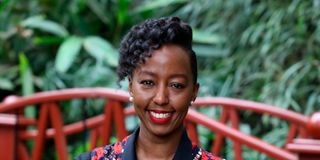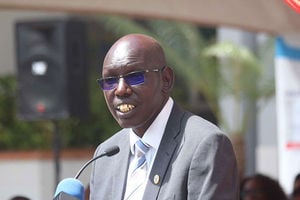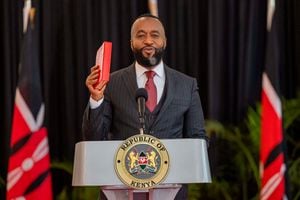Teaching Africa to mind its food

Dr Nungari Mwangi.
In 2004, 17-year-old Nungari Mwangi boarded a plane for the first time in her life with a one-way ticket from Kenya to Wales, United Kingdom, not knowing that the next time she would come back home would be six years later.
Upon completing her secondary school education at Precious Blood Riruta, Dr Mwangi received a scholarship to the United World Colleges (UWC) in Wales where she passed the International Baccalaureate diploma.
She was then awarded the Shelby Davis scholarship, through UWC, to join Brown University, an Ivy League institution in the United States, to study political science.
“I have to thank my parents for letting me travel at such a tender age. I grew up in Buruburu and did not know where Wales was. The beauty about moving away from home alone was that I became open to new possibilities and crafted my own path,” she said.
“It was a big risk but it has paid off. I am glad that I had the courage to step out on my own. My parents helped me board my flight and wished me well. I did not have a mobile phone until later on.”
Currently, Dr Mwangi is the program officer at the Centre of African Leaders in Agriculture (CALA), an initiative led by the AGRA that supports African countries and sector leaders to deliver top national priorities in food security.
Her love for history and governance in high school had prompted her to prioritise a career in law, although she ended up choosing to study international relations at Brown University. However, after a few classes, she found that the curriculum did not include any African content or history.
“It felt very foreign and alienating, that is why I switched to political science and Africana studies. There was fear of whether I was going to get a job: what do you do with an American degree in political science?” she asked.
Nonetheless, Dr Mwangi tried to quell the curiosity within her that aimed to understand the world and what makes human beings create and use the current governance systems we have today.
This led her to take up summer fellowships with Humanity in Action in France, and the International Institute for Political and Economic Studies in Greece, where she studied and researched on minority rights issues and conflict resolution.
“I became very interested in development when I was exposed to very many different environments through the International Honours programme. We started our journey in New York then went to Sao Paulo in Brazil.
In each city, we were tasked with understanding the mechanics of city governance. We then travelled to Cape Town for a course in the history of spatial segregation. It was the first time I experienced racism in my own continent,” she recalled.
Dr Mwangi believes that the exposure of the experiences during the four years of her degree shaped her thinking and inspired her to become a humanitarian.
Straight after she graduated, she got into the Humanitarian Leadership Development programme in East Africa where she worked with international organisations in food security such as Christian Aid and Save the Children.
“Humanitarian programmes have been initiated, run and implemented by foreigners. But the issue came in sustainability in terms of leadership. We are dealing with fundamentally East African challenges. So, why don’t we have East African leadership?” she asked.
She got hands-on experience in southern Ethiopia while working with Christian Aid. She was involved in understanding the urgency of food security and actively looking for funding to implement solutions that would help the community.
“The work of the humanitarian industry is to keep people alive, maintain their livelihoods and ensure that they move from a crisis into stability by creating development solutions.”
She recalled a visit to a village in Chalbi Desert where she met a woman who practised mist harvesting. She collected 100 litres of water from the air per day using mesh structures. Dr Mwangi saw that the woman had created a solution for the water problem. However, it was not a long-term one.
“I quickly became frustrated with the humanitarian space. The humanitarian problems that we were and are still dealing with such as the drought in 2010 that saw four million struggle with hunger in the Eastern Horn of Africa were recurrent and predicted since the 1970s. If it is an event we can map, then we can plan for it,” she said.
She explained that the truth is in some countries where governments do what they are expected to do — and there is no development sector.
“I never saw myself in a space like agriculture but I come from a long line of women who have worked in development. My grandmother was a social worker and my mother worked in community development. I get attracted to jobs that require problem-solving and bring people together for a cause,” she said.
She then joined Dalberg Global Development Advisors in Nairobi, which also gave her a chance to finally move back home to be with her family.
“The transition back was difficult because I keep thinking outside the box whereas normally people just stick to doing what is ‘by the book’. I also noticed this when I interviewed young Kenyans for roles.
"They showed acceptance of the existing state of affairs rather than finding out how they could use their roles to provide solutions to current problems. You need to remove yourself from your environment to develop critical thinking. Make yourself uncomfortable,” Dr Mwangi said.
She also felt alienated as her peers had already formed a certain way of thinking that was different from hers, but this also helped her feel liberated.
Her return prompted her to find out what development models would work for Africans that are not transplants of ideas that worked in other countries such as Singapore. She finally attained the power to actualise it through CALA by creating a link between the public and private sectors where there was a disconnect.
“The programme brings together decision-makers and managers from both sectors who who are spearheading programs of national interest in agriculture. We have had two cohorts so far, bringing the total number of delegates to 160 from eight countries in less than a year,” she said.
In each cohort, CALA takes up 10 delegates from Kenya, Tanzania, Rwanda, Uganda, Ethiopia, Malawi, Ghana and Nigeria. The programme is also keen on succession management and supports rising stars in agriculture to work with their seniors and succeed them in years to come.
“Food and nutrition insecurity in Africa is the result of poor planning and unfair global trade rules that do not allow African countries to reap as much from their sales. Yet, Africa can feed itself,” Dr Mwangi said.
African Development Bank President Dr Akinwumi Adesina, stated in 2017 that Africa imports $35 billion of food net annually, expected to rise to $110 billion by 2025, if current trends continue.
“We must think differently. Africa produces 75 per cent of cocoa but receives only two per cent of the $100 billion-a-year chocolate markets. The price of cocoa may decline, but never the price of chocolates. The price of cotton may fall, but never the price of garments and apparels. In 2014, Africa earned just £1.5 billion from exports of coffee. Yet Germany, a leading processor, earned nearly double that from re-exports,” said Dr Adesina.
Dr Mwangi admits that development in agriculture is a long-term plan but one that can pay off once African countries manage to sufficiently produce, process and market their own products. These were part of the discussions in the recent AGRF Summit held in Kigali earlier this month, attended by over 250 delegates including Cala’s two cohorts.
“The African Union recommends that every member state should allocate 10 per cent of their national budget to agriculture. Kenya tends to be between three and four per cent while Rwanda and Ethiopia are close to nine per cent,” she said.
Dr Mwangi holds a MPhil in Development Studies and a PhD in international development from the University of Cambridge in the UK. She also sits on the board of the Digital Opportunity Trust and the Kenya National Committee for United World Colleges.
Her role in leadership started as early as high school where she was the head girl. She went on to become one of the founders of a refugee youth tutoring programme and the chair of African students in university.
In 2016, she was awarded the Global Andrew E Rice (Truman) Award for leadership and innovation by a young professional in international development by the Society for International Development in Washington DC, USA.
Dr Mwangi enjoys the outdoors in her free time, as running and hiking are two of her favourite pass-times. She also likes cooking and trying out new recipes. She enjoys reading African literature and is currently reading Wild Seed by Octavia Butler.
“I spend a lot of time with my family. It felt this pull to come home and stay grounded after so many years of being away. I am settled for a while until the next adventure calls me,” she said.
Dr Mwangi credits her faith for keeping her grounded.





